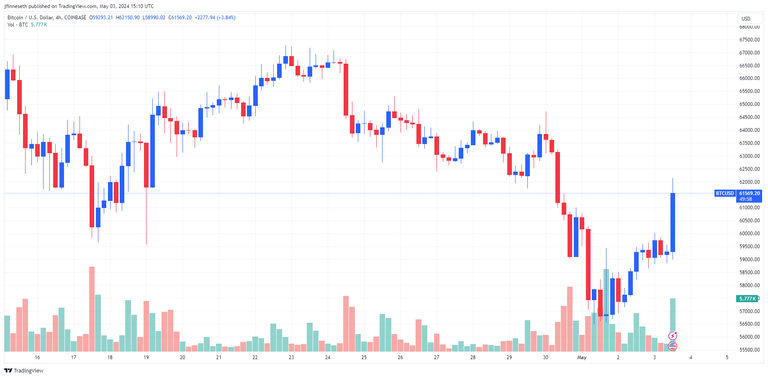Recent events in the crypto space have influenced the rally of major currencies, including Bitcoin – the digital gold. Traders in the market are in the green as Bitcoin surges to 50% of its all-time high and garners more investors’ confidence in the digital asset.
The total number of investors showcasing these profits in their crypto addresses includes a huge portion of all registered BTC addresses. This development can be attributed to a number of factors and events that have shaped the trajectory of Bitcoin’s market value.
Bitcoin addresses recording profits
The world’s largest crypto by market cap records a huge milestone amid the increased number of wallets being in profits, making history in the crypto industry. This development hints at the potential adoption of BTC by institutional investors and proves Bitcoin’s long-term potential.
However, based on the market’s high volatility, it is still rather challenging to predict the market’s direction accurately, but experts have shown their confidence in digital assets by backing the first-generation blockchain and minting profits.
Considering Bitcoin’s surge over the past weeks, one major reason attributing to this price surge includes events on spot Bitcoin ETFs. This has seen BTC’s price soar up to the $35,000 level last week, and it is currently trading at $34,354 at the time of writing. An increase in investor inflows has also been witnessed in the network, and more than 80% of Bitcoin addresses recording profits.
Moreover, these numbers are new in the crypto industry, and this is noted as a significant checkpoint for the major digital asset. According to the latest on-chain data analysis firm, Glassnode has recorded a number of Bitcoin addresses being “in the black.”
Bitcoin’s price corrects to the $34,000 level. It records a fresh high not seen in the past 18 months.
However, these gains have been substantial in influencing investor gains and advising their portfolio profitability. As of October 30, data from Glassnode records a number of 39.1 million BTC addresses in profits. This has been a new high of over 10 million from its previous high of 38.1 million in November 2021.
Additionally, this was when Bitcoin hit its all-time high of $69,700. A result of this high was seeing 100% of Bitcoin addresses in existence at that time record profits and a non-zero balance.
Reasons for the increased gains in BTC addresses
However, considering the spot price remaining lower than its initial all-time high, the nonzero addresses total to 48.3 million. Notably, these numbers have yet to correspond to the 18-month high witnessed during BTC’s recent bull rally in 2021.
According to Glassnode, the increase in address profits includes a 20% gain from 69% in a span of just 2 months.
On the other hand, addresses at a loss currently stands at 9 million, and this is a positive number from its high of 20 million in late 2022 during the fall of the famous crypto exchange, FTX.
According to additional market data, the current Bitcoin price records levels well above multiple resistance points marked in the past. Long-term and short-term BTC holders have all recorded gains in their investments.
A result of this is sparking huge yields for the holder spectrum, who witnessed these profits after BTC crossed over $34,000.
What is the future of BTC ETFs in the DeFi market?
According to an informant, some of the world’s major market-making businesses are in the running to potentially supply liquidity for BlackRock’s much-awaited bitcoin ETF if regulators approve the product.
According to a BlackRock presentation deck examined by a source familiar with the situation, trading titans Jane Street, Virtu Financial, Jump Trading, and Hudson River Trading have conducted discussions with BlackRock about a market-making role.
If the Securities and Exchange Commission approves some or all of the dozen or so applications for bitcoin ETFs (including one from BlackRock, the world’s largest asset manager), it will open a new path for U.S.-based firms to participate in crypto in a way that plays to their traditional strengths.
Being a market maker for ETFs, which trade on exchanges like stocks, necessitates a level of complexity and automation that only a few organizations possess.
ETFs rely heavily on market makers. They are in charge of issuing and redeeming new ETF shares, which helps to keep the ETF’s price tied to the price implied by the ETF’s holdings.





